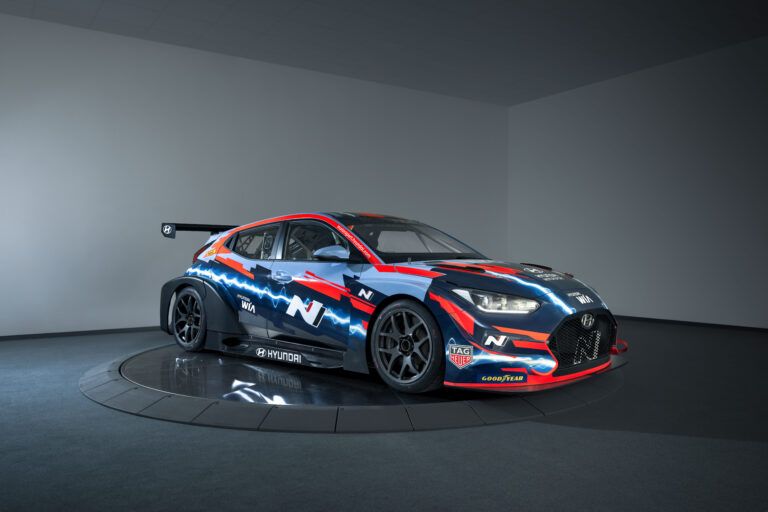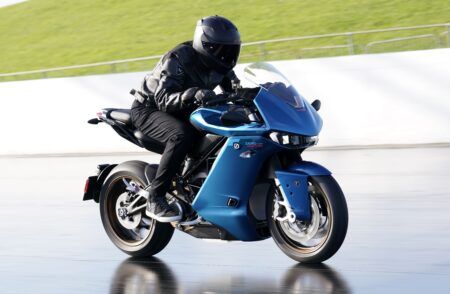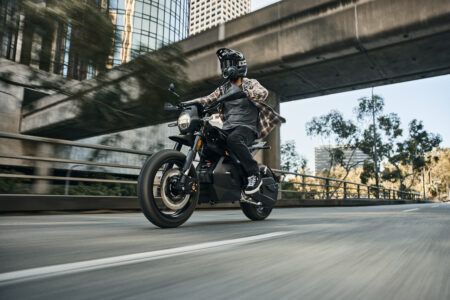Hyundai Motorsport will soon participate in the inaugural all-electric touring car championship PURE ETCR, which will commence later this year. PURE ETCR will set the benchmark for electric racing around the world and accelerate the transition to emissions-free mobility.
Ahead of the PURE ETCR championship, Hyundai Motorsport’s engineers designed and built the company’s first all-electric high-performance vehicle, the Veloster N ETCR, at its headquarters in Alzenau, Germany. Like the i30 N TCR and i20 N Rally2, it is based on a highly-modified version of another Hyundai N car, the North American Veloster N model.
Testing on the Veloster N ETCR began with a prototype design in September 2019, which the team continued to develop throughout 2020. It is a zero-emission, rear-wheel drive touring car with mid-mounted motors and designed specifically for ETCR regulations. Equipped with a 798-volt battery pack from Williams Advanced Engineering located in the floor of the car and a double-wishbone rear suspension, the chassis is radically different from any previous Hyundai Motorsport project. It boasts a peak power output of 500 kW (equivalent to 680 PS) and a continuous power of 300 kW. The Veloster N ETCR’s engine consists of four motors – two per wheel – which are connected to a single gear ratio gearbox.
“ECTR is a testbed for Hyundai’s future mobility models. With the Veloster N ETCR, we are proving how cutting-edge technology can be combined with eco-friendly driving to make motorsport cleaner,” said Till Wartenberg, vice president and head of N Brand Management and Motorsport Sub-division at Hyundai Motor Company. “By building an electric race car, we will prove a high-performance EV is feasible. The gathered knowledge and data through our experiences on the track, are the basis to optimise and improve our BEV and FCEV models.”
PURE ETCR presents Hyundai with the opportunity to push its electrification systems to the limit under the most extreme conditions. However, while high-performance is a key tenet for the company, it is also committed to making the competition, as well as the future of motorsport and performance cars more generally, as environmentally-friendly as possible. For Hyundai, this does not stop with the zero-emission drivetrain. Rather, the whole ecosystem has to be sustainable, from power generation to fuel transport.
Hyundai will be offering its new hydrogen generator as a recharging system for electric vehicles. The Hyundai Generator is the newest feature of emission-free electric charging and consists of two fuel cell stacks. First, the generator is filled up using tanks of compressed hydrogen. Inside the fuel cell stack, the hydrogen is exposed to oxygen. The ensuing chemical reaction generates energy. This energy is used to charge the batteries of the electric touring vehicles. This way, participants can be sure that the electricity used to charge the cars also comes from emissions-free, sustainable sources.
The Hyundai Generator allows two EVs to charge simultaneously. As well as featuring a high-speed charging capability, it also offers significantly reduced noise levels compared to a diesel generator. Beyond e-racing, Hyundai is also confident its hydrogen-powered generator has a range of different potential use cases, such as festivals, construction sites and crisis situations.
“For Hyundai it is important to always have a holistic view on zero-emission mobility. With solutions like the Hydrogen Generator, we are able not only to run emission free vehicles but also guarantee that the electricity is produced emissions-free by using green hydrogen to power the generator,” said Thomas Schemera, executive vice president and chief marketing officer, Hyundai Motor Company. “In Hyundai’s move to become a Smart Mobility Solutions Provider, we will further develop zero-emission appliances for different aspects of our lives.”





